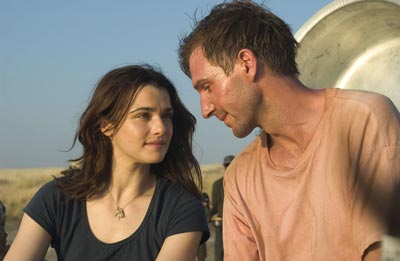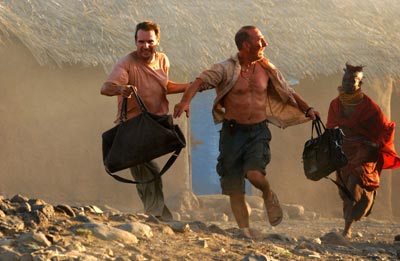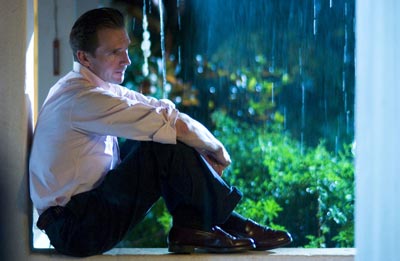The Constant Gardener
Intelligently paced thriller, slickly directed and well acted. Jolly good show, what?

Fernando Meirelles, acclaimed director of the acclaimed City of God directs this adaptation of a John Le Carr novel that despite the title has only a tangential relationship with gardening. Justin Quayle (Ralph Fiennes) is a very reserved, very English diplomat working in Africa whose life is shattered when his activist firebrand of a wife Tessa (Rachel Weisz) is killed. It's written off as a random act of passion perpetrated by their friend, Arnold (Hubert Kound?) with whom Tessa was travelling, but this seems rather suspicious to Justin.
He's right to be suspicious, as delving into the investigations Tessa was undertaking before requiring the undertaker points to a unscrupulous British pharmaceutical company underhandedly skewing the results of a clinical trial that a drugs company would very much like to pass. Of course, there's no way the British government could be involved in such deviousness, is there?
All of the above takes time to be uncovered, especially as about as much time is devoted to Justin and Tessa's relationship in the time between their meeting and her untimely death as is to the reasons behind her killing. This is no bad thing, Fiennes and Weisz capturing an unusual kind of chemistry born of Justin's almost stereotypically reserved nature. It adds some diversity to something which might otherwise have become something of a dryer, less interesting variant of The Insider.

Now, I was quite fond of The Constant Gardener. Indeed, I still am. For some reason I'm having trouble writing much in the way of gushing praise and instead I'm left with some near vanishingly slight niggles stuck in the forefront of my tiny little mind.
The only one that I'll actually hold up as a proper barrier to enjoyment stems from Justin's character. As the damn near stereotypical English gent his upper lip is kept so stiff you'd think he'd been applying topical Viagra. While that's a perfectly valid way to play a character, and by the end of the piece you get some idea of the pain he's been feeling, for much of the flick he's so stoically brave-faced that it's really quite difficult to empathise with the fellow.
Meirelles brings a similar sense of stylistics to this as his earlier work, so if you've seen City of God (and if you haven't, you really should). He shows the poverty of the African slums with the same slick technical nous he's shown previously, but this time there's something odd about it. While obviously, it's the setting for the story, the emphasis he has on it seems at odds with the narrative which has little to do with the shanty towns. It's as though he's found a familiar crutch to show the backstreets, if you can call them streets, of Nairobi slums and damned if he's not going to shoehorn the plot into them. It's arguably far better than the same conversations exchanged in a random office, but it's occasionally intrusive.
What else? Well, it's a little heavy on the ol' non-linear narrative codswallop, but seeing as this has had something of a welcome rest of late since 21 Grams drove the idea so far into the ground it could no longer be seen by the naked eye this doesn't annoy too much.

Most of which is picking at nits, although they serve to take enough of the polish off of the final product to give us pause. The only one that's really important is that first one, and by the time the cracks finally show in Justin's demeanour it seems far too out of character to believe his grief. For a film seemingly referred to as an Oscar contender this is an odd failing, but it's not one that stops it being an enjoyable film.
And The Constant Gardener is an enjoyable film. The conspiracy that is danced around for much of the film is a nice, rabble rousing spot of intrigue that the more conspiracy prone amongst us will delight in as a run up to Mikey Moore's Sicko. It's delicately handled, gradual reveals being paced to keep your attention but not make it too obvious who's really responsible for Tessa's death.
The acting is pretty much flawless, the locations never less than stunning, the pacing expertly judged, the title misleading. I mean, there's really precious little gardening going on, just like Marathon Man doesn't really revolve around either long distance running or the delicious peanut filled chocolate bar that would go on to be sacrilegiously renamed 'Snickers'.
Again, I'm struggling to say exactly why it's so enjoyable, because it's not as though I can point out some thrilling CG setpiece, car chase, shootout or donkey inflation. It's just a thriller that does pretty much everything it sets out to do with a minimum of fuss and maximum of impact, and has the sheer audacity to credit its audience with a lick of intelligence. It's almost like a mid-seventies film, where this sort of thing was far more common than these vacuous times where we get 'treats' like Stealth and Bad Boys II shoveled at us. I'm going to have to follow the hurd on this one
Were I in the business of passing quantifiable judgements, I'd award this 4/5 TippyMarks.
Rachel Weisz (Tessa Quayle)
Hubert Kound? (Arnold Bluhm)
Danny Huston (Sandy Woodrow)
Bill Nighy (Sir Bernard Pellegrin)
Gerard McSorley (Sir Kenneth Curtiss)